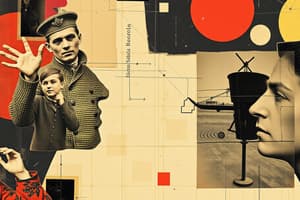Podcast
Questions and Answers
What does Republic Act 8293, section 176 state regarding copyright?
What does Republic Act 8293, section 176 state regarding copyright?
No copyright shall subsist in any work of the Government of the Philippines.
What must be obtained before exploiting government works for profit?
What must be obtained before exploiting government works for profit?
Prior approval from the government agency or office.
Borrowed materials included in the module are owned by their respective copyright holders.
Borrowed materials included in the module are owned by their respective copyright holders.
True (A)
What is the purpose of the Media and Information Literacy Alternative Delivery Mode (ADM) Module?
What is the purpose of the Media and Information Literacy Alternative Delivery Mode (ADM) Module?
Who is the Secretary of the Department of Education?
Who is the Secretary of the Department of Education?
What symbolizes skill, action, and purpose in the learning resource?
What symbolizes skill, action, and purpose in the learning resource?
What is included in the 'What I Know' part of the module?
What is included in the 'What I Know' part of the module?
What is communication?
What is communication?
Which of the following are parts of communication? (Select all that apply)
Which of the following are parts of communication? (Select all that apply)
What is the role of the receiver in the communication process?
What is the role of the receiver in the communication process?
Feedback is only verbal.
Feedback is only verbal.
Match the communication model with its characteristics:
Match the communication model with its characteristics:
The __________ is the way in which a message travels between the source and receiver.
The __________ is the way in which a message travels between the source and receiver.
What are some factors that may affect communication?
What are some factors that may affect communication?
Flashcards are hidden until you start studying
Study Notes
Media and Information Literacy Module Overview
- Focuses on the evolution of media and information literacy within the Senior High School curriculum.
- Aimed at assisting teachers and facilitators in meeting K to 12 curriculum standards.
Legal Information
- Republic Act 8293, section 176: Government-created works have no copyright but require agency approval for profit exploitation.
- Agencies may impose conditions, including royalty payments for the use of such works.
Module Development Team
- Writer: Rex Pales
- Editor: Melanio R. Florino Jr.
- Reviewers and Management Team include notable educators from various fields.
Intended Audience
- Designed for both facilitators and learners.
- Supports independent and guided learning activities tailored to individual pacing.
Learning Structure
- What I Need to Know: Outlines expected skills and competencies for the module.
- What I Know: Includes assessment activities to gauge prior knowledge.
- What’s In: Provides brief drills for skill reinforcement.
Teaching Approach
- Encourages a collaborative and supportive teaching environment.
- Teachers are expected to guide learners in using the module effectively and track their progress.
Learner Empowerment
- Emphasizes the learner's role in achieving academic success through active engagement and independent learning.
- Symbol of a hand represents skill, action, and empowerment for learners to accomplish learning goals.
Contact Information
- Printed by Davao City Division Learning Resource Management Development System.
- Office located at Elpedio Quirino Ave., Poblacion District, Davao City, with available contact numbers and email for inquiries.
Communication Overview
- Communication involves transferring information between individuals or groups.
- It is a process of sending and receiving messages through verbal or nonverbal means.
- Messages generate meaning across different cultures, contexts, channels, and media.
- It is a misconception to view communication as a straightforward process.
Basic Parts of Communication
- Source: The originator who imagines, creates, and sends the message.
- Message: The stimulus or meaning produced for the receiver, which can be interpreted in various ways.
- Channel: The medium through which messages travel from the source to the receiver.
- Receiver: The individual or group that interprets and analyzes the message, potentially affecting its intended meaning.
- Feedback: The response from the receiver to the source, which may be verbal or nonverbal and informs the source of message reception quality.
- Additional components include the environment (physical and psychological), context (setting and expectations), and interference or noise (elements disrupting communication).
Communication Models
- Aristotle’s Model: Early model emphasizing the need for speakers to tailor messages to the audience and occasion for effective communication.
- Shannon-Weaver Model: Developed by Claude Shannon and Warren Weaver, illustrating a sender as the message source, encoder as the transmitter, decoder as the reception point, and receiver as the message destination. Known as the "telephone model."
- Osgood-Schramm Model: Highlights that communication effectiveness depends on the interpreter’s appreciation and understanding of the message.
Studying That Suits You
Use AI to generate personalized quizzes and flashcards to suit your learning preferences.




